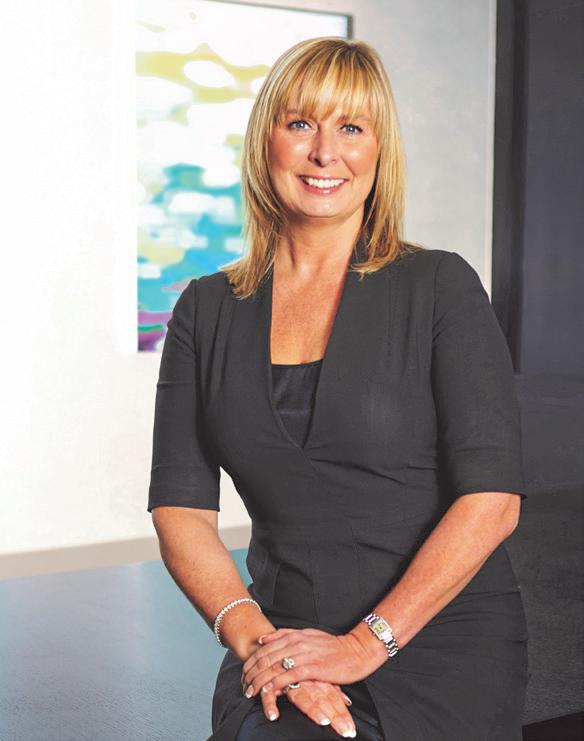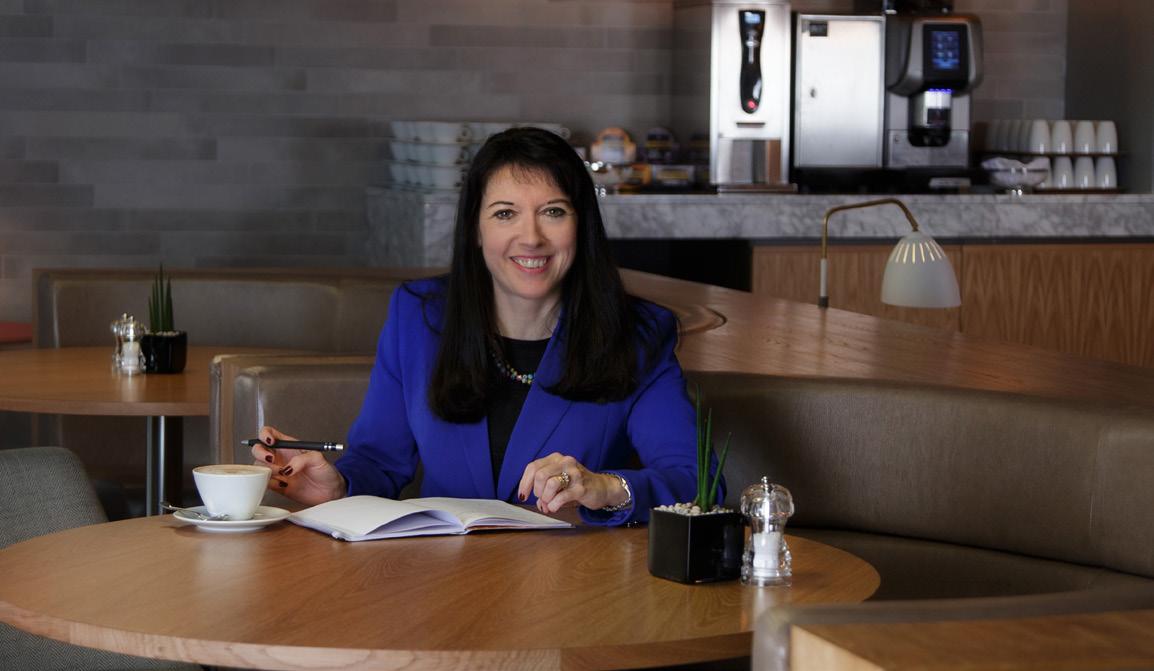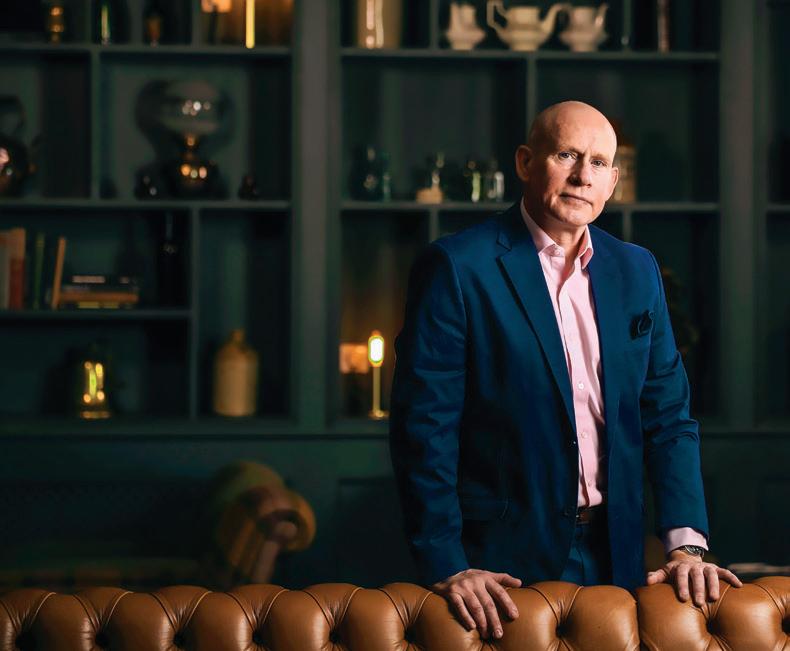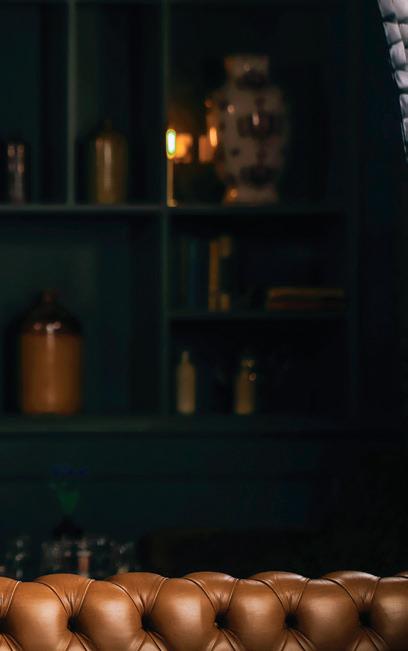
20 minute read
MY PERSPECTIVE NICOLA TAYLOR
ON THE FOLLOWING PAGES HOSPITALITY OWNERS AND OPERATORS SHARE THEIR OWN EXPERIENCES OF COVID-19 AND THEIR VIEWS ON HOW IT HAS BEEN HANDLED BY GOVERNMENT AND WHAT IT MEANS FOR THE FUTURE OF HOSPITALITY IN SCOTLAND.
MY OWN PERSPECTIVE
Advertisement
Iam writing this from our own perspective as a family business owning and operating 6 hotels in Scotland under a global franchise with IHG – Holiday Inn Glasgow Theatreland, Holiday Inn Expresses; Glasgow Theatreland, Edinburgh Royal Mile, Edinburgh Airport, Perth and Dunfermline.
“Our journey started a little earlier than many when I arrived in Marseille at an IHG European Owners meeting on Monday 9 March. I knew the coronavirus was becoming a concern and I’d even considered cancelling my trip. But nothing prepared me for hearing firsthand an emotional Italian owner’s devastating experience. No guests and zero income with no ability to pay their staff or anyone else. It’s something I will never forget, a bit like “where you were on 9/11?”. Then hearing IHG had shut down over 200 hotels in China, WOW I realised this was going to be bad.
I was meant to travel from Marseille to London for meetings later that week. However, given what I’d heard, I flew straight back to Glasgow to brief our senior team and GM’s. I think that was one of my hardest trips home as I tried to figure out how to break the news, how to be factual, honest and unemotional. Everyone’s reaction was very different and that’s what makes us human. We all start the journey at a different time, we all accept change at a different speed, and we always need to try to remember that. (It will be the same as we eventually come out of this.)
In some ways, we were lucky to have a couple of weeks before lockdown to pull together some sort of plan and make sure our focus was on keeping as many people in jobs as we could, especially to get the business back up and running once this was over. We knew it’d be a few months of disruption BUT we BY NICOLA TAYLOR, CHIEF EXECUTIVE , CHARDON HOTELS
remained focussed on coming out the other side and ensuring we had a business to give our great teams back their jobs.
I don’t think I slept much that week, or for the rest of the month. From 9th to 31st March I made 1,712 outgoing calls from my mobile phone. Who to? To be honest, I can’t remember but it was probably anyone who would listen to me about helping our industry! If I couldn’t speak to them, I emailed or texted them. To think one of the best loved industries was being torn apart was very difficult to get my head around. This was like 9/11, SARS, the Ash Cloud, the Snow and a Tsunami all rolled into one perfect storm.
I know hospitality has historically been of little interest to politicians and local government. However, when they saw the sheer scale of the job losses, I think even they were shocked when they realised the number of jobs and supply chains our industry supports.
Ours is a complicated business that people outside the industry just don’t understand. In Scotland, I think the trade bodies did an amazing job of working together to try to help all their members. They ensured the message to Government was consistent from all sides and wouldn’t be lost in a lot of unnecessary noise and detail we operators can get into.
Personally, and like most owners, we were looking into a big black hole with no idea where the bottom was (we still don’t!) To try to get ahead of the curve, we took the difficult decisions to lay off staff with under 2 years’ service and put the rest of our teams on consultation. We took these steps a full week before the word ‘furlough’ became part of the country’s vocabulary. For me, the UK Government were late coming out with this offer, however when it happened, it did allow us to furlough everyone - even those we’d initially let go. Ironically, I’m sure some of the draconian measures taken by people like Richard Branson, Gordon Ramsay and Tim Martin at Wetherspoon’s actually gave the UK workforce a better furlough % offer than any other European country.
It is very difficult coming in and out of a recession to change people’s mindset on how good or bad the situation is, and this happened at a speed many could not imagine. Shutting a hotel when the onsite hotel team are confirming it is full of bookings is difficult for everyone involved. And to be honest I already knew from my European counterparts that most guests who had booked would fail to turn up.
We also needed backup security staff to go into our closed hotels as we knew looting could become an issue and if any of our team became ill, we needed others to slot in. I think the Police have done an amazing job as our “in
hotel teams” confirm they have never felt safer in Glasgow or Edinburgh.
I am very lucky to have a small senior team who got behind everything, so we ran the fixed costs numbers quickly to go to the bank. This was maybe a bit early as neither the brand nor Booking.com had started their money back guarantee with our money for prepaid, non-transferable reservations. We even had the pleasure of picking up the credit card fee for the debit and credit, costing us more money. I’m not saying it isn’t the right thing to do BUT it blew a £750k + hole in our cashflows. If only the UK had copied Italy and France where the Government rushed in legislation for a voucher scheme to allow guests to move bookings, the cash WOULDN’T have been lost from the
hotel industry.
Losing the property rates bill for a year was a godsend as that released about £1m from our fixed costs. We own rather than rent the properties, so we managed to get a capital repayment holiday. As we’d just refinanced, this has now been added to the next 19 years of our capital repayment schedule. To be honest though I have no idea how some of the large operators who lease or have big ground rents will make these payments with no income?
Hotel owners are traditionally asset rich and cash poor. They don’t have large sums of money sitting in a bank account for a ‘rainy day’. They employ a lot of people and are continuously re-investing in their properties, just like anyone owning a large house. It needs constant maintenance and there are large capital and interest mortgage payments to make. (We are in fact in the middle of a refurbishment in one of our Glasgow hotels and were trying to get it ready for what we hoped would be a busy summer!)
In terms of funding the business through this crisis, initially the options were a commercial loan or overdraft then latterly government funded loans. RBS, with whom my family have banked with since 1972, have been great but rightly keep reminding us these are loans we do need to pay back. I refuse to write down what this has cost us BUT I can’t stop my head running the calculation especially around 3am each morning (any tips on how to stop this would be most welcome)
But let’s be honest, this is affecting everyone in our industry. It doesn’t matter if you’re the coffee shop owner with 3 staff or the hotel company that employs 000s, if you have no income, you have no ability to make the payroll, fixed costs, rent and certainly not loan repayments!
We’ve also learned a lot about Insurance companies too – they’ve done an amazing job in avoiding pay-outs. One must question why do we actually pay insurance? Whilst I believe the government should be putting pressure on these companies, I also don’t believe infecting another industry is the answer as long as the government continues to support us, but NOT solely with loans the majority can’t ever repay.
And that’s it in a nutshell for this industry, ‘how will we ever pay it all back?’ Personally, I think I’ll be working till I’m 90 BUT quite honestly having spent 6 weeks at home I will happily work till I drop. I really miss the people and that is something everyone in hospitality will be struggling with, because it is a people business.
Moving forward we still need answers on aspects of furlough. We also need more support coming out of this. The deferred VAT that needs paid in Q1:21 might be too much of an ask and we may need that deferred again. I think the restaurants and bars along with staycations at hotels in the country and seaside will come out of this much quicker than city centre hotels. I try to tell myself otherwise, hoping there will be lots of people who want a party in the city, eat out, go to the movies and get their lives back to ‘normal”’quickly.
If the government just ends furlough then we go back to pre-furlough days and mass redundancies. With a forecast of less than 40% hotel occupancy till the end of the year and business not expected to be ‘normal’ until the summer of 2021 we can’t just keep on adding to the mounting debt as there will be little point as many will just bust. We probably need another year’s property rates holiday and a continuation of furlough for those in travel and tourism. Otherwise, there was no point in introducing furlough to keep people in jobs. in the first place.
As I look back and try to reflect on what we did well and maybe not so well I remind myself; we make the decision based on the facts we have at the precise time and I haven’t spoken to any business owner that isn’t and wasn’t trying to do the best for their staff because, without them, we won’t have a hospitality industry to re-open.”
We’re always planned for new openings at Apex, never closures so like everything else these days it’s all unchartered territory.
Priorities have been getting our head around furlough and other business reliefs as well as keeping in touch with our staff and customers. We are grateful for the reliefs that have become available, particularly for the Job Retention Scheme which clearly enabled us to keep staff on the payroll. However, as we go through the phases of survival we are now asking questions around how long will the scheme continue and what happens when we re-open our doors and the world won’t be the same as we left it. That is our major concern currently, shifting from 90% occupancy levels to 30%, if we are lucky. Recovery won’t be overnight and predictions are that it will take at least 18months to get back to sustainable levels. Lack of clarity on lockdown exit strategy, extension of financial support and easing of travel restrictions makes it extremely difficult to scenario plan for the future. That said, there is comfort in the fact that we are all in this together, other travel and tourism industries are experiencing similar pain and ultimately the situation has to improve at some point. So more positively looking forward we need to find the resilience to start over again and look for innovative new ways of operating and diversifying revenue streams to make the industry great again. We are fortunate to be in a position to press the reset button in a country which offers the perfect setting for recuperation, adventure, sightseeing, culture and culinary pleasure. We need to harness the opportunity to embrace the staycationer and then, when the time is right, welcome back international visitors. This is without doubt a transitionary period of convalesce where we need to nurse our businesses back to full health and in doing so re-invent sustainable and more flexible operating models that can more adeptly adjust to modern day crisis prone scenarios.” UNCHARTERED TERRITORY BY ANGELA VICKERS, CEO, APEX HOTELS

IN IT TOGETHER BY BILL BURNETT, CYCAS HOSPITALITY

It’s difficult to imagine that just a few weeks ago, very few people were talking about Covid19 and hardly anyone had heard the term furlough. And yet here we are in mid-April in the midst of the greatest crisis to hit our industry and our wellbeing in living memory. The need to learn fast and adapt is something I’m sure we can all relate to.
Of our 2 hotels in Dundee – we had to close Hotel Indigo. Our Staybridge Suite was more easily able to meet government guidelines and we already had guests with no alternative accommodation – so we kept Staybridge open and it has now become a hub for key workers.
Both of our hotels are owned privately and the immediate stoppage and reductions in cash flow offered extreme challenges. The government incentives offered to industry are by necessity not ‘simple’ to obtain and with future business being completely uncertain, there have been many tough decisions being made.
Furloughing the majority of our staff has been difficult but completely necessary to safeguard them and the future of the business. We are currently dealing with the furlough process which in itself is a challenge. I use an accounting firm and have a great Financial Controller, but this process is difficult to say the least. I really do expect some operators to really struggle with using this lifeline. Ideally furlough would have allowed us to retain a wider spectrum of key team members on a ‘part-time’ basis, but the guidelines were specific, and this was not allowed. So, we’ve reduced to a minimum operational team.
Aid in relation to Business Rates, and VAT returns were in effect much easier to navigate and these are readily welcomed. They will in themselves though not replace immediate cash flow – essential for supplier payments and current staffing needs. And with the uncertainty of the future trading climate, the low rate business loans on offer are still a risk that many businesses may not be willing to undertake. There is no doubt that our economy and our industry globally has many years of recovery ahead of it.
Operationally, we’re having to adapt what we do in order to safeguard my team and my guests. We’ve become minimalist. In many ways, we’ve reduced service levels through necessity – and our guests have been absolutely magnificent.
There really has been a genuine sense of ‘we’re all in this together’ As the only major hotel in Dundee to remain open, we are genuinely offering refuge for key workers
only – we’re very specific at check-in. Reasons for stay have to be checked and supported by documentation by the employer. For those staying, they are genuinely grateful that we’ve been here for them.
The team that has stayed on to look after the business are going above and beyond. I’ve named them as SuperHeroes. Each day they make the day special for our guests – and although we’ve reduced some services, we’ve also added some genuine daily surprises – little parcels of kindness outside every guest suite – a token of thought, sometimes a gift, or a joke, a beverage - a connection. Many of our guests are alone and away from their own family. In some ways, although we are all respecting our distances, we’ve gotten even closer to our guests.
Eventually I am sure that much good will come from all of this. For the time being we are mindful of those who are dealing with loss and we know that many of us will be touched by this. We respect the real heroes of the NHS and the service they are delivering ahead of personal safety. In contrast that really makes the challenges we face ourselves seem all the more manageable.
Hospitality will survive this crisis and will in time be stronger than before, because every hotel has its own Superheroes.”
DAVID COLLINS, CO-FOUNDER AND CHIEF OPERATING OFFICER FOR THE GREAT NATIONAL GROUP, SUGGESTS THAT STATE-SPONSORED DEBT FORGIVENESS MAY BE THE ‘SILVER BULLET’ THAT THE TOURISM INDUSTRY NEEDS AS IT LOOKS TO RE-EMERGE FROM COVID-19.
C19 has brought about lots of restrictions, most are worthy and warranted. The protection of front-line staff is unquestionably, undoubtedly critical and welcome. Equally citizens now, more than ever before, need to actively ensure personal restraint for their own safety and that of others. This is an unseen enemy which knows no boundaries although it does need to be said that it may perhaps have been enabled by the serial under-investment in public health to the point that it seems governments are now forced to bid for knock-off, sub-standard PPE from the very country that is the origin of this viral pandemic. Go figure.
Leaving all that aside, what’s happening now on the world stage is concerning and will only compound the challenges facing the tourism industry. Once united nations are now beginning to adopt unilateralist, selfprotectionist measures, literally becoming silos in survival mode. Case in point, the European Union’s 60 year-old-plus history has been undermined in less than 6 weeks as countries start to do solo runs on fiscal, social and economic policy.
Unchecked this could pass a tipping point where an emotional tsunami – fuelled by wide-scale bereavement, enforced self-isolation and raging uncertainty – will overcome even the most resolute to the point that society itself might collapse. This is not unthinkable by the way. And if you think

it is, who would have thought that the entire world could be brought to its knees within a matter of weeks by a bat. Or a pangolin. Or whatever species of animal/mammal it was. The mind boggles.
To be kind, there is no precedent for the scale of what is being experienced globally therefore is it fair to focus on inefficiencies in preparedness? Probably not. It is instead the response that communities, institutions, governments deploy that provides the context for how this calamity is being dealt with.
The tourism industry has largely stepped up to the mark. Pubs have closed. Restaurants have shut. Hotels lie vacant. Obviously this has not been entirely selfimposed: state lock-downs and enforcement rules have made it impossible to trade what is essentially ‘social’ business. What is marked however is that there have been few if any operators that have attempted to defy these bans with a universal acceptance and compliance obvious from the get-go. This despite the fact that this could prove terminal. And in some cases has already done so.
As attention turns to ‘what next’ in terms of how do we re-emerge the economy, there’s talk now that the tourism industry will be among the last, if not the last, sector to be permitted to re-open for business .. so basically it looks like we’re first to close and the last to open.
And whereas again there may be a general acceptance for this – the

practicalities are in truth hugely challenging – the stoic-ness shown by tourism operators to date should not be taken for granted. Nor should the sheer number of people employed in the industry be forgotten .. 250k in Ireland, nearly 4m in the UK and 300m+ globally.
Many other sectors will be taking the initiative so as to at least keep them at the forefront of policy-makers’ minds – after all if you’re not at the table, you’re on the menu – so it falls to ourselves and all our colleagues throughout the tourism industry, to actively engage in figuring out a blueprint for going forward. Leadership from trade associations and lobby groups will be key here but more importantly, I would suggest leadership from amongst operators on the ground.
As to a solution for helping the tourism industry to re-emerge from this calamity, grants and loan holidays in themselves while welcome will simply not cut it such is the scale of the challenge facing our industry. Lateral thinking is what’s needed here so for example is it not reasonable to suggest some level of debt forgiveness as regards rates, water charges, VAT and corporation tax, much in the same way in the last crash debt was taken off banks’ balance sheets to allow them space to regroup and stabilise for recovery? Similarly business, and in particular small to medium sized businesses such as is typical in tourism, should likewise be provided with this opportunity.
Unprecedented? Well, sort of but not really. Again refer to my point above about the banks. But then again we’re now in unprecedented times and uncharted territory, and as such the old rules simply don’t apply. We need new rules for a new normal to allow us as an industry to reboot whilst continuing to enable the controlled management of this pandemic which has beset us all.
‘Moral hazard’ will likely be deployed to argue against state-sponsored debt forgiveness as it could ‘encourage bad behaviour’, etc.. And yes, while there may be a few operators that would take advantage of such a write-off or even a write-down, the vast, vast majority of operators are honest, hard-working citizens concerned about their livelihood and the livelihood of their employees who have done the right thing, and now turn to the State to likewise do the right thing.
What is therefore needed is an extension of the ‘Social Contract’ deployed by Governments and Citizens who combined symbiotically to respond to C19 and now need to do this again to create an accelerated resurgence. Society will be the ultimate winner, the prize being stability, inclusivity and community .. and a fasttracked recovery. In terms of how this might be structured, there are folks on a much higher pay-grade than myself on this issue but it is surely within the gift of governments to for example create a C19-related Special Purpose Vehicle or SPV whereby the associated costs of dealing with the pandemic plus this proposed write-off, are bundled together and capitalised or written off over 100 years? As a colleague of mine pointed out, this money is not owed to some divine power that has to be repaid under punitive terms.
And as to managing C19, it will be with us it appears for a while to come so again the hotel industry has a responsibility here in adapting to rolling lock-downs and restrictions on operations: for example, implementing social distancing will leave some restaurants half-empty. But that said, at least they’re half-full ..
What will certainly emerge will be a new model for the tourism business, for how we operate, how we engage with clients, how we price, etc.. It will however be lessened as a challenge perhaps as we’re all effectively in the same boat including each of our competitors and customers so there may be more space and tolerance than we might think for adapting to this new normal.
Critical to this however will be equality and transparency in terms of enabling practical solutions for business as there’s now a heightened sensitivity to and expectation for the State and its bodies to do – and be seen to be doing – the right thing. This is in fact a huge, ‘once-ina-generation’ opportunity to recalibrate the global economy for the better, to address systemic dysfunction and to enable sustainability.
As they say, never waste a good crisis..”




